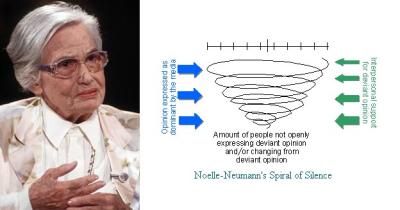Noelle-Neumann's Spiral of Silence and voicing opinion in the blogosphere

I just scanned a paper by Korean researcher Jeong Kim that links the Spiral of Silcence theory to processes in the blogosphere. In short, SoS theory states that individuals with opinions that contradict majority opinion tend to remain silent, while individuals who feel like they are representing the majority tend to speak up.
Jeong Kim asks what this concept means in the realm of blogs where, in contrast to 'big media' such as TV and newspapers, minority opinions can (technically) be easily voiced and interaction is possible on a one-to-one level.
What´s particularly interesting about this paper is the researchers methodology: he asks two (quite prominent) Korean bloggers to act as his informants and to reveal in their blogs two attitudes which are considered to be minority opinions in Korean society: open pro-Americanism and pro-Japanism (?). A rather funny experiment, I believe. it kind of makes me want to try this myself...
Anyway, the paper comes to the conclusion that in the blogosphere, voicing out minority opinions can lead to an (unforeseen) high level of exposure, sometimes leading to the point where the blog author chooses to beomce less visible by closing the blog, moving it, or limiting the visibility of certain posts and comments. Jeong Kim says that blogging is characterized by a 'paradoxical interplay between struggle for and struggle by visibility'. Quite true, isn´t it?!
texastee - 18. Mar, 18:05
4 comments - add comment - 0 trackbacks
colson (guest) - 24. Mar, 19:46
check
Sounds perfectly convincing to me.
(I still owe you an answer to an question you posed to me in relation to your previous post. Till now I've failed to come up with a coherent reaction. I'm still thinking on it.)
(I still owe you an answer to an question you posed to me in relation to your previous post. Till now I've failed to come up with a coherent reaction. I'm still thinking on it.)
Jeong Kim (guest) - 26. Aug, 06:51
surprise
Hi there.
I am surprised that some one actually discusses my paper.
It is embarrassing to see it, since I am not too confident with my own work. I often feel that I am a subject, if not victim, of the spiral of invisibility. I do not want to be visible in the academia, while
contradictorily, I have to make myself known.
thanks for your post.
I am surprised that some one actually discusses my paper.
It is embarrassing to see it, since I am not too confident with my own work. I often feel that I am a subject, if not victim, of the spiral of invisibility. I do not want to be visible in the academia, while
contradictorily, I have to make myself known.
thanks for your post.
teigan (guest) - 12. Mar, 04:27
i'm very late to the party but if i may comment
even before blogs, unpopular opinions are voiced less. both you and the researcher mentioned need to make a clear distinction between majority opinions and popular opinions. for example, popular opinion is that justin bieber is a musician. majority opinion is quite the opposite, but we never hear from them. for a more ominous example: popular opinion is that the police protect the public, but majority opinion is the opposite.
popular opinions are created by the media and peer pressure. what's more, when people see someone talking about issues in the media, they assume the loudest voices represent the most people. this is a logical fallacy. gay and jewish culture are prone to hysterical complaining, and thus they dominate public agenda and opinion. however, very few people actually care about their usual trivial issues.
even before blogs, unpopular opinions are voiced less. both you and the researcher mentioned need to make a clear distinction between majority opinions and popular opinions. for example, popular opinion is that justin bieber is a musician. majority opinion is quite the opposite, but we never hear from them. for a more ominous example: popular opinion is that the police protect the public, but majority opinion is the opposite.
popular opinions are created by the media and peer pressure. what's more, when people see someone talking about issues in the media, they assume the loudest voices represent the most people. this is a logical fallacy. gay and jewish culture are prone to hysterical complaining, and thus they dominate public agenda and opinion. however, very few people actually care about their usual trivial issues.
texastee - 17. Mar, 04:53
better late then never :)
Hi teigan, unfortunately, this blog has been abandond by me with the end of my university thesis. Yes, the discrepancy you describe between popular opinion and majority opinion is very close to what is described in the 'spiral of silence'. Namely that opinions which are less popular or fit less well with current trends or topics on the political agenda tend to be perceived as non-existent, although they may be carried by quite a significant number of people. And because no-one speaks about it, people with that opinion are even less likely to talk about publicly. that's the spiral effect, which has been researched extensively well before blogs came about.
Communicaiton in blogs has its very own, unique effects, just think of shit storms or the streisand effect..
Communicaiton in blogs has its very own, unique effects, just think of shit storms or the streisand effect..



Trackback URL:
https://texastee.twoday.net/stories/4794872/modTrackback